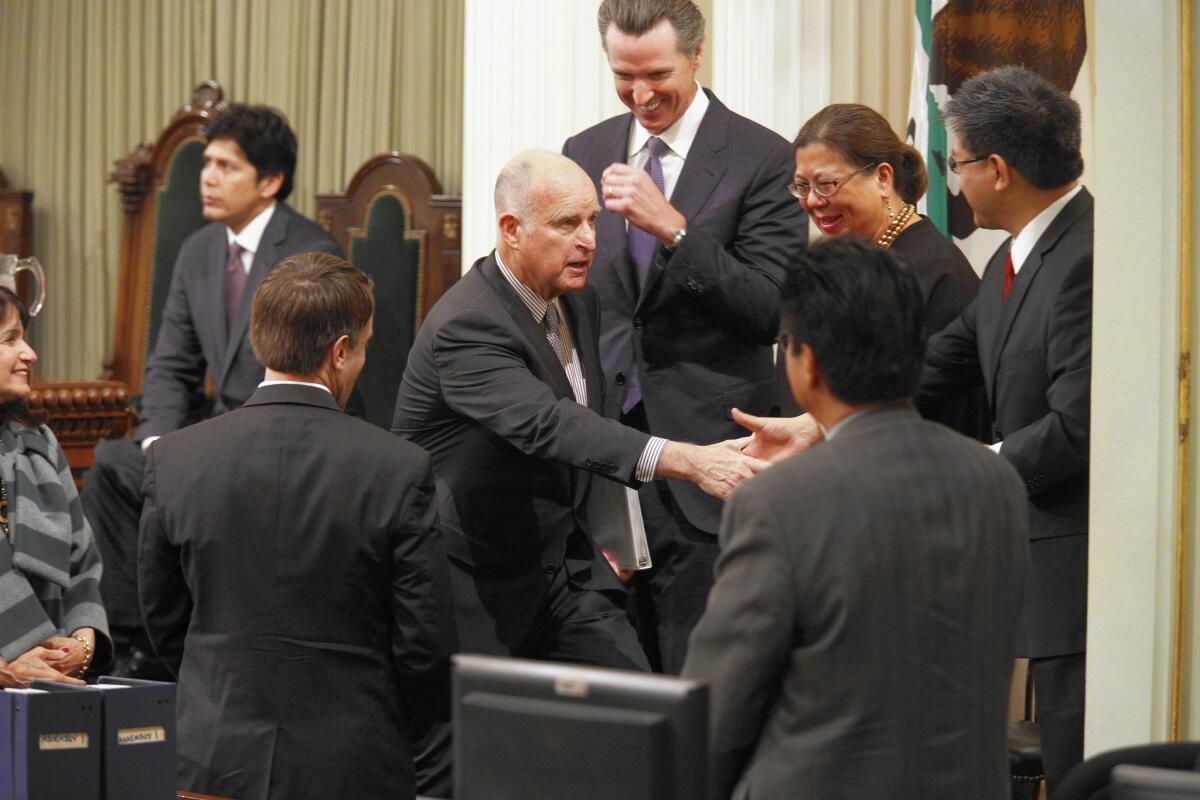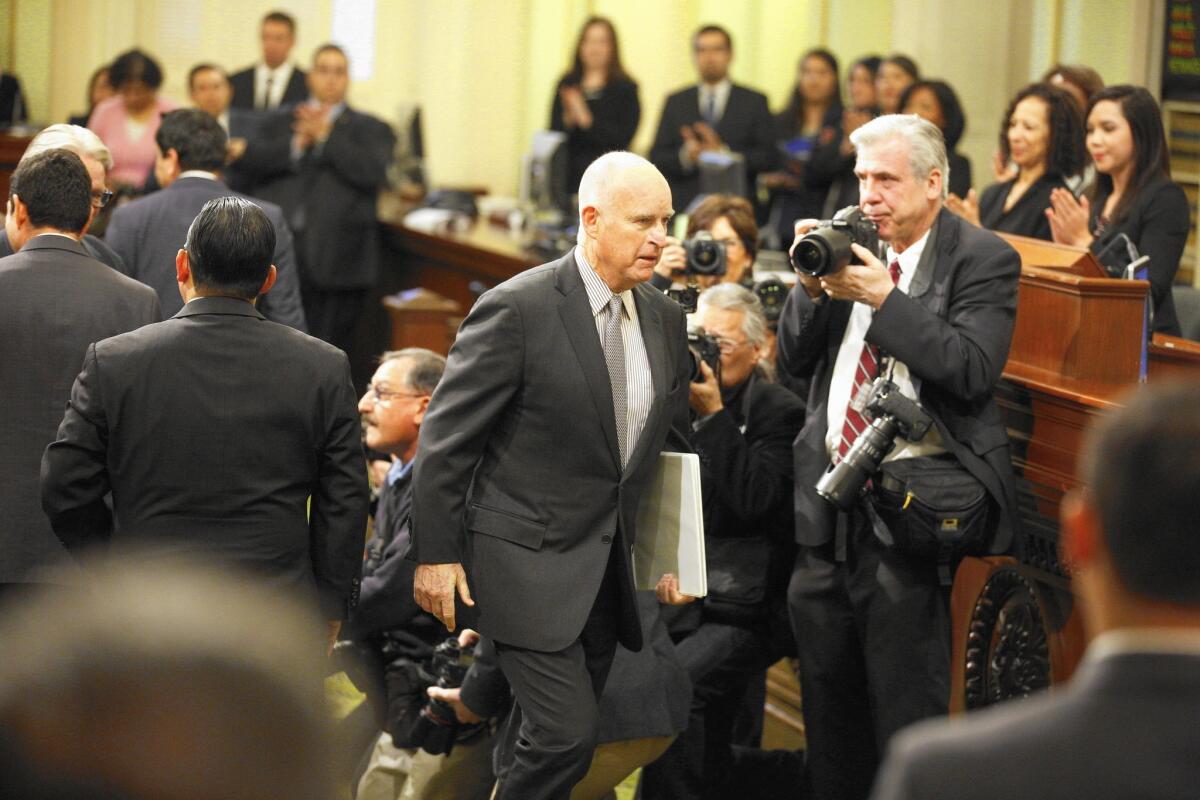Capitol Journal: What Gov. Brown’s State of the State speech lacked: punch

Gov. Jerry Brown shakes hands at his State of the State address before a joint session of the California Legislature in Sacramento on Jan. 21.
SACRAMENTO — Unlike other governors, if Jerry Brown had his druthers about the annual State of the State address, he’d probably just skip it.
He doesn’t appear to put much stock in the tradition — doesn’t see it as a ripe opportunity to pitch pet projects, make a hard sell to the Legislature and public of his solutions for California.
Previous governors have seized the spotlight to attract statewide attention. Brown can command that any time he wishes. Actually, he seems to prefer a national TV talk show audience.
The governor’s State of the State speech last week was not entirely a kiss-off. But afterward I found myself asking: What was that about?
Yes, there was the customary pageantry: statewide officeholders, California Supreme Court justices and members of both legislative houses packed into the ornate Assembly chamber with its 19th-century decor; his wife in the balcony.
But there wasn’t the traditional anticipation and excitement. Those present knew from past history what to expect from Brown: Not much.
The disappointment wasn’t the speech’s relatively short length — fewer than 20 minutes. That was par for Brown. In 2014, his address lasted 17 minutes.
The governor’s first inaugural address in 1975 lasted just seven minutes. The next year, he stretched his State of the State remarks to 11 minutes and uttered this depressing line that became a career-long theme: “We are entering an era of limits.”
The downer in last week’s speech was the lack of punch. And Brown — who boxed a bit in high school and once floored an opponent — is as capable of throwing a hard punch as any politician.
Instead, he seemed to be trying to duck controversy.
No mention of his pet $68-billion bullet train, an increasingly unpopular project. Critics are trying to place an initiative on the ballot that would derail the train and spend its money on water development.
There was only a brief reference to Brown’s other controversial project: digging twin 30-mile-long, 40-foot-wide tunnels under the Sacramento-San Joaquin River Delta at a cost of $15.5 billion. It would siphon fresh Sacramento River water before it reaches the delta, jeopardizing fish, recreation and local agriculture.
The word “tunnels” didn’t cross Brown’s lips. Instead, he used the bureaucratic jargon “conveyance.” He lumped it with such sorely needed projects as aquifer recharging, groundwater management, storm water capturing, recycling, desalination and dams.
“Achieving balance between all the conflicting interests is not easy,” he said. “I pledge to you that I will listen and work patiently.... Pitting fish against farmer misses the point.... Every one of us and every creature that dwells here … must be understood and respected.”
A call for compromise between water hogs and environmentalists, San Joaquin Valley and delta farmers, Southern and Northern California? Perhaps. But as the governor spoke, his administration released a disingenuous video promoting his tunnel vision.
Brown also didn’t spend much time on another obsession: global warming, which he flew all the way to Paris to rail against at a United Nations summit.
“Incredibly, though last year was the hottest on record,” he said, “there are still those, particularly in Washington, who are in denial. But even the deniers can’t deny the carbon pollution that exists all over the world.”
There were no new global warming proposals, however.
And nothing about reform of the much-abused California Environmental Quality Act, a burden on developers. Brown once called it “the Lord’s work.” He still must be waiting for the Lord to do it.
“You are not going to hear me talk today about new programs,” he told the lawmakers. “I am going to focus on how we pay for the commitments we have already made.”

Gov. Jerry Brown at the State of the State address.
Not every good idea costs money, of course. But obviously the governor thinks he has plenty on his plate right now.
Predictably, Brown preached fiscal conservatism. Despite being a Democrat, he always has been a tightwad — at least concerning other people’s proposals.
A governor can control dollar outgo by himself, however, regardless of how much a Legislature tries to spend. He has veto power.
Pushing for higher savings as a hedge against the next recession, Brown asserted that lawmakers “must be realistic about our current tax system. California has a very progressive but volatile income tax that provides 70% of general fund revenue. If we are to minimize the zigzag of spend-cut-spend that this tax system inevitably produces, we must build a very large reserve.”
Not necessarily. The governor and the Legislature could change the tax system and widen the base, greatly reducing the volatility. But that would mean extending the sales tax to services. And few have the courage, especially Brown.
For me, the speech’s highlight came at the beginning in a Brown ad lib — “a light joke,” he called it.
The termed-out governor noted he had three years left in office “unless I take my surplus campaign funds [$24 million] and put [an] initiative on the November ballot to allow a four-term governor to seek a final fifth term.”
It wasn’t so much what he said but his jocular demeanor that struck me. Lawmakers laughed and some chanted: “Four more years.” Brown broke into big, broad grin — one that reminded me, for the first time, of his gregarious, oft-self-deprecating father.
Gov. Pat Brown would never have kissed off a State of the State address.
Twitter: @LATimesSkelton
More to Read
Sign up for Essential California
The most important California stories and recommendations in your inbox every morning.
You may occasionally receive promotional content from the Los Angeles Times.











